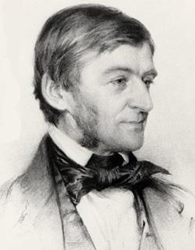Ralph Waldo Emerson—essayist, minister, poet and philosopher from New England—was the founding father of the transcendentalist movement and the creator of many literary works praising nature and its relationship to humanity and creation.
Ralph Waldo Emerson’s Early Days
Ralph Waldo Emerson was born on May 25, 1803, in Boston, Massachusetts, to a Unitarian minister and his religious wife. Emerson’s father, who died when he was only eight years old, came from a long line of ministers, and his son would follow suit. The young Emerson attending Harvard Divinity School and became a minister of the Second Church in Boston in 1829.
In September of that same year, Emerson married Ellen Louisa Tucker, who died of tuberculosis a few years after their marriage. His wife’s death prompted him to question and doubt his religion and vocation, and led him to abandon his church.
Emerson left America to travel extensively around Europe, and upon his return, began his career as a lecturer and essayist. In 1835, he married Lydia Jackson, with whom he settled in Concord, Massachusetts, and raised a family of four children.
Sources in this Story
- Virginia Commonwealth University: American Transcendentalism Web: Ralph Waldo Emerson
- The Literature Network: Ralph Waldo Emerson
- The Transcendentalists Web Site: What is Transcendentalism?
- Stanford Encyclopedia of Philosophy: Ralph Waldo Emerson
The Philosophy of Emerson
Emerson’s first high-profile work was “Nature,” a collection of essays published in 1836 that inspired the entire movement known as transcendentalism. According to Jone Johnson Lewis on the Transcendentalists Web site, transcendentalism attempted to “define spirituality and religion…in a way that took into account the new understandings their age made available.”
In the book, Emerson sought to change America’s interpretation of and relationship with nature. The book helped to establish Emerson as one of the originators of an American style and tradition of writing. Although “Nature” is probably the most famous of Emerson’s works, he published many other books and wrote numerous essays during his extensive career as a lecturer.
Emerson gained considerable fame as a minister, lecturer and poet, but his primary legacy is due to his work as a philosopher. University of New Mexico philosophy professor Russell Goodman outlines the main themes of his philosophy, derived primarily from “The American Scholar” (1837), written after his renowned “Nature” and delivered as an address to the select students of Phi Beta Kappa. This work advocates “that the scholar is educated by nature, books, and action,” according to Goodman.
The Ralph Waldo Emerson Institute offers a digital collection of Emerson’s complete works.
The Man and His Work
- “Nature and Selected Essays,” by Ralph Waldo Emerson
- “Ralph Waldo Emerson,” by Oliver Wendell Holmes
- “The Essential Writings of Ralph Waldo Emerson,” by Ralph Waldo Emerson
- “Essays & Poems by Ralph Waldo Emerson,” by Ralph Waldo Emerson
- “The Spiritual Teachings of Ralph Waldo Emerson,” by Richard Geldard
The Rest of the Story
Emerson and Margaret Fuller started “The Dial” in 1840, which “was the official publication of the Transcendentalists until 1844,” according to The Literature Network. He lectured in America and in Europe, and published collections of poems and essays. A fire damaged the Emerson home in 1872, so the family went to Europe and Egypt while repairs were made. While Emerson found success as a philosopher and lecturer, his life was plagued by losses, according to the American Transcendentalists Web. These included the loss of his father; the loss of all three of his brothers; his first wife, who died when Emerson was 20; and the loss of his son and namesake, Waldo, when the boy was just five years old. Emerson died of pneumonia in 1882 at the age of 78. His house in Concord is now a museum and historical landmark.
This article was originally written by Rachel Balik; it was updated April 28, 2017.











